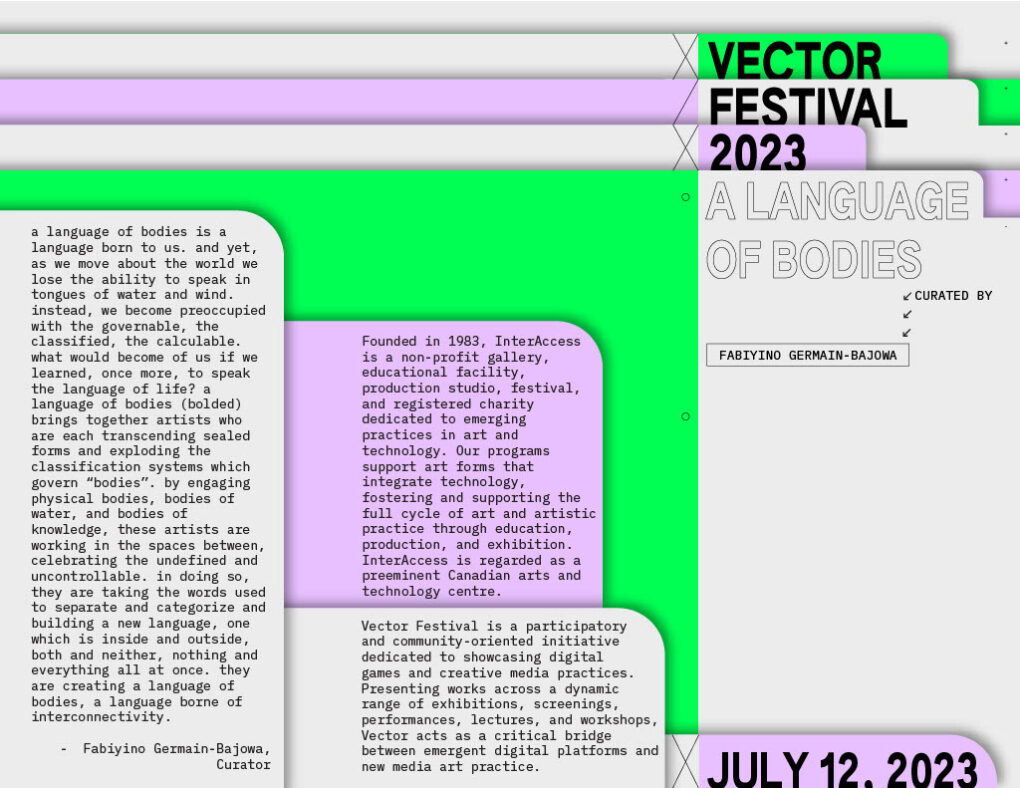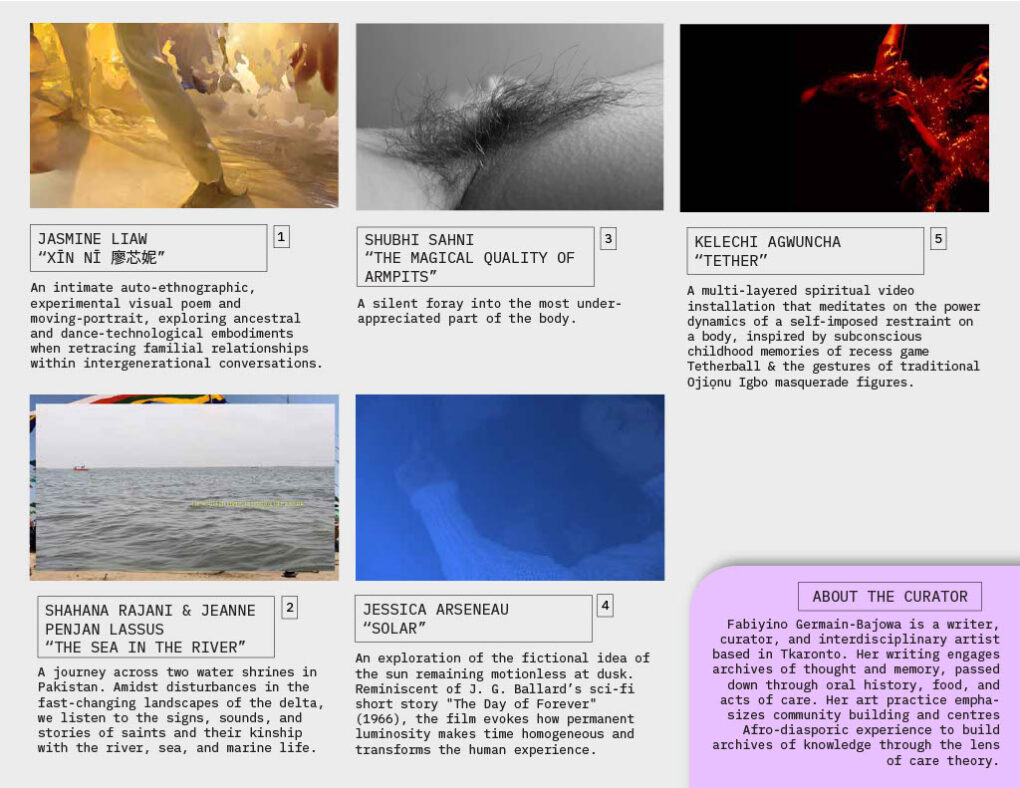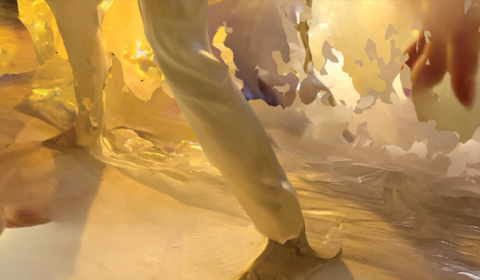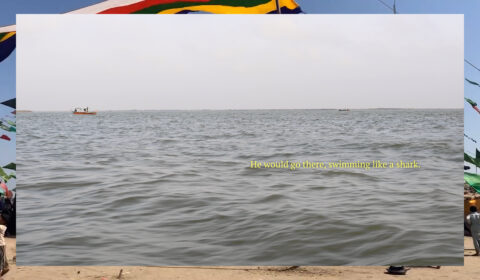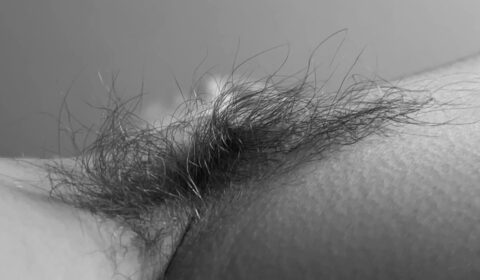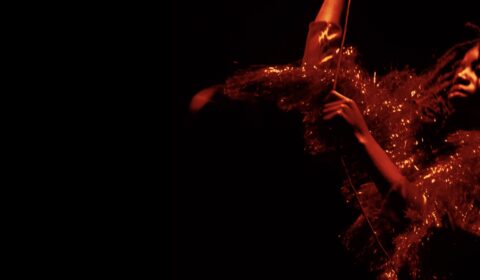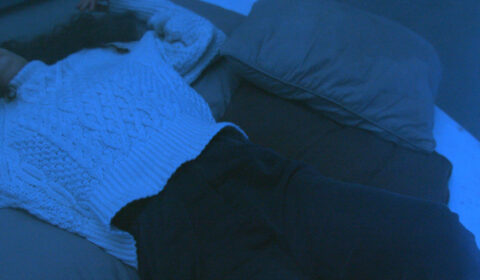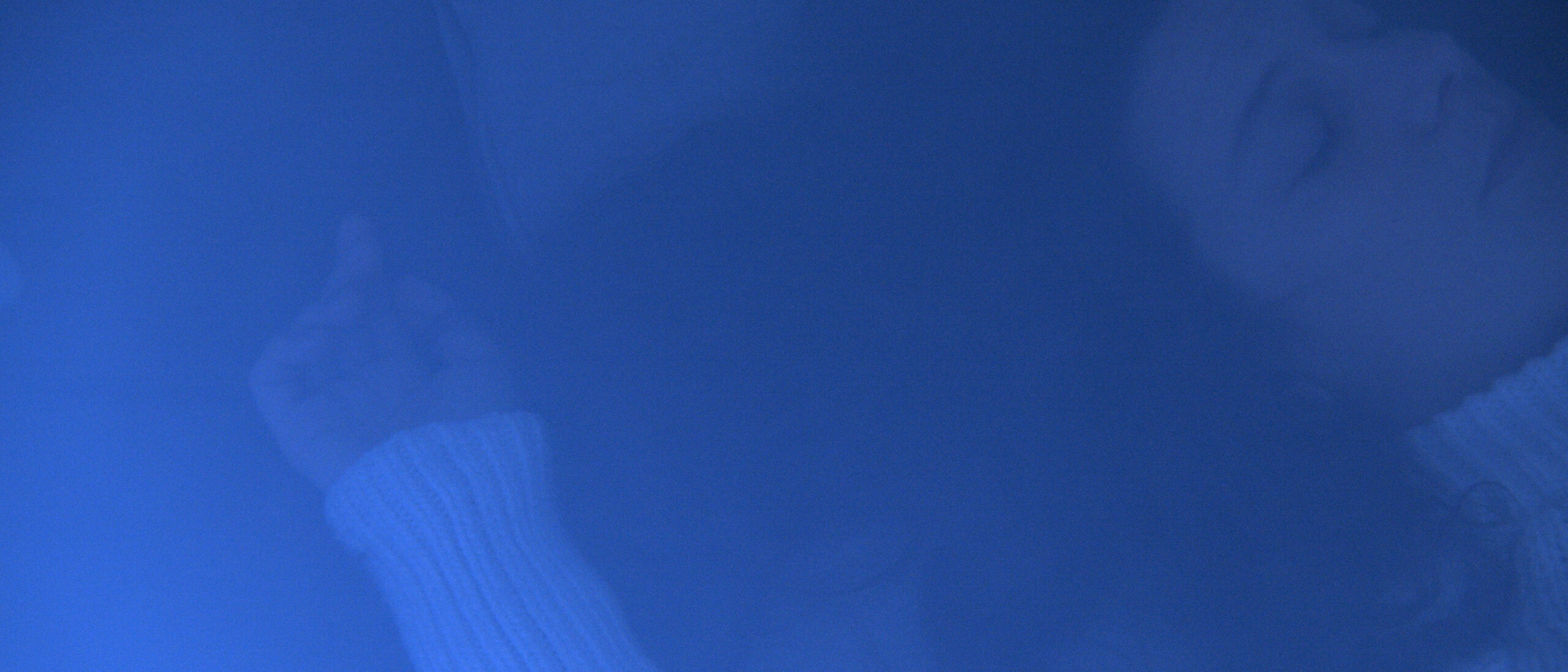
↗ Curated by Fabiyino Germain-Bajowa
Wednesday, July 12, 2023
Small World Music (180 Shaw St., Toronto ON M6J 2W5)
Tickets: PWYC, $10 suggested
Doors open: 7:30 PM
Screening starts: 8 PM
Q&A: 8:45 PM
a language of bodies is a language born to us. and yet, as we move about the world we lose the ability to speak in tongues of water and wind. instead, we become preoccupied with the governable, the classified, the calculable. what would become of us if we learned, once more, to speak the language of life? a language of bodies brings together artists who are each transcending sealed forms and exploding the classification systems which govern “bodies”. by engaging physical bodies, bodies of water, and bodies of knowledge, these artists are working in the spaces between, celebrating the undefined and uncontrollable. in doing so, they are taking the words used to separate and categorize and building a new language, one which is inside and outside, both and neither, nothing and everything all at once. they are creating a language of bodies, a language borne of interconnectivity.
PROGRAMME
↗ xīn nī 廖芯妮 - Jasmine Liaw
As an intimate auto-ethnographic, experimental visual poem and moving-portrait, xīn nī 廖芯妮 explores ancestral and dance-technological embodiments when retracing familial relationships within intergenerational conversations. Bridging the gaps surrounding my Chinese given name and its Hakka translation, this linguistic divide is common in Western diaspora culture, and navigating these marginalized displacements through my contemporary dance practice has created space for healing. I often feel inside and outside of my Hakka culture, as I also question my understanding of queer culture and its intersectionalities. Am I Asian enough within the Hakka Asian diaspora? Am I queer enough within my own physical experience and externalization? These themes of decolonizing queerness resonate with how I exist within and challenge the queer Asian diaspora. The film’s physical bending of binaries, as reactionary connections to ancestral stories and responsive gestural communication devices, lean into queer self-love and self-curiosity. Queering diasporic culture allows me to exist intimately, experiment with the body sensorially, and investigate the phenomenological consciousness of my queer and cultural displacement. Holding space and appreciation for my elders’ storytelling supports the growing-web of my ancestral knowledge through physical listening exchanges with my family and in my community.
↗ The Sea in the River - Shahana Rajani & Jeanne Penjan Lassus
The Sea in the River is a filmic journey across two water shrines in Pakistan. The film first takes us to a shrine on an island in the Indus Delta, near the Pakistan-India border. Stories of Dada Sanvlo–known as the saint of sharks–alternate with those of the delta’s disappearance and legends of fishes going on pilgrimage. Retracing the route of the palla fish, we journey up the Indus River to the shrine of Khizr Hayat, the saint of all water bodies. Amidst sensings of tension and disturbance in the fast changing landscapes of the delta, we listen to the signs, sounds and stories of these saints and their kinship with the river, sea and marine life.
↗ The Magical Quality of Armpits - Shubhi Sahni
A silent foray into the most under-appreciated part of the body.
↗ Solar - Jessica Arseneau
Solar explores the fictional idea of the sun remaining motionless at dusk. Reminiscent of J. G. Ballard’s sci-fi short story "The Day of Forever" (1966), the film evokes how permanent luminosity makes time homogeneous and transform the human experience. Solar transports us into a room filled with agitated fog, pillows and blue light intended to simulate dreams. Part of a poem by Emily Dickinson, "The Sun kept setting — setting — still" (published in 1890), is recited, expressing the sensation of drowsiness under an unchanging light. The film unfolds in the manner of a daydream where natural and architectural elements are activated as if they were the protagonists of a world where time is inevitably present.
↗ tether - kelechi agwuncha
tether is a video installation that meditates on kelechi agwuncha's subconscious childhood memories of performance. It documents a new ritual that bridges their memories of playing the recess game, "tetherball" and witnessing traditional Ojiọnu Igbo masquerade figures gesture in a kind of spectacular, uncensored reality. As a multi-layered spiritual performance the film observes the filmmaker performance as a meditation on the power dynamics of a self-imposed restraint on a body.
ABOUT THE ARTISTS
Jasmine Liaw is a queer emerging Chinese-Hakka Canadian interdisciplinary artist in dance performance, new media art, and experimental film. Bicoastal, she is based in so-called Toronto and Vancouver. Her practice explores the complexities of her contemporary views of Hakka diaspora, queerness, and environmental anxiety. She is the Artistic Associate of Chimerik 似不像 Collective, working in interdisciplinary research and creation.
Shahana Rajani is an artist based between Karachi and Toronto. Her work traces the visualities and infrastructures of development and militarisation using multidisciplinary methods and media. Community-based and collaborative approaches to research are central to her practice.
Jeanne Penjan Lassus is a Thai-French visual artist and filmmaker based in Bangkok. Her works draws from reflections on sensory perceptions and porosity of spaces and bodies. Enquiring how we – humans and other beings – sense and make sense of our environments, her practice focuses on how those perceptions shape our experiences, shape the way we move and extend into space, shape the language we use.
Shubhi Sahni is a Canadian filmmaker and sound designer based in Los Angeles. She makes intimate films that move between documentary and fiction. Shubhi is an Annenberg Fellow and Arts + Climate Awardee at the USC School of Cinematic Arts, where she is pursuing her MFA in Film and Television Production.
Jessica Arseneau works with video as a general starting point for an installation practice, accompanied by sound, text, light, and photographs, that constructs an atmospheric space. Science fiction narratives, mythologies, imaginary of the future, and critical observation are poetically activated in her work. She received a B.A. from the Université de Moncton and a diploma in media arts from the Academy of Fine Arts in Leipzig.
kelechi agwuncha (b. Chicago, IL) is an Igbo-American filmmaker, video & sound installation artist who uses a structuralist approach to create a set of interventions upon sports & bodily movement that become rehearsals of play. As a former athlete, they are interested in playing with the theatrics & embodiment of performative techniques of endurance. They received an MFA in Visual Arts at University of California, San Diego and studied under the Isaac Julien Lab of the University of California, Santa Cruz.
ABOUT THE CURATOR
Fabiyino Germain-Bajowa is a writer, curator, and interdisciplinary artist based in Tkaronto. Her writing engages archives of thought and memory, passed down through oral history, food, and acts of care. Her art practice emphasizes community building and centres Afro-diasporic experience to build archives of knowledge through the lens of care theory. She recently earned her BFA in Criticism and Curatorial Practice from OCAD University, where she is a research assistant with the Centre for the Study of Black Canadian Diaspora, and is a Curatorial Assistant at Equitable Bank.
ASL interpretation will be available. Small World Music is wheelchair accessible.
Reach out to Vector Festival Assistant mena@interaccess.org with any questions or requests leading up to the event.
